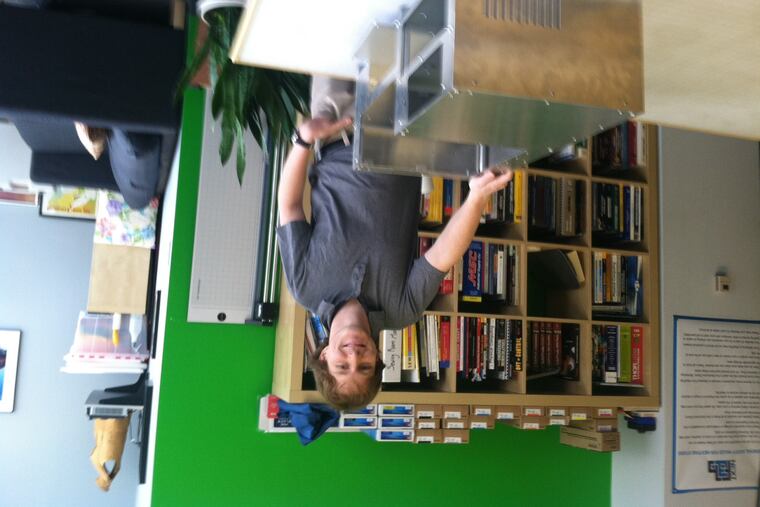PhillyDeals: NextFab helps designers build their dream gadgets
Armed with a new doctorate from Cornell; designs for 3-D printers that make colorful parts from paper, plaster, and plastic; and connections from his academic and consulting career, engineer- tinkerer-businessman Evan Malone returned to Philadelphia in 2008, opened NextFab Studio, and began marketing the for-profit lab full of digital workshop machines to the students, professors, and would-be entrepreneurs of the city's brainiest neighborhood.

Armed with a new doctorate from Cornell; designs for 3-D printers that make colorful parts from paper, plaster, and plastic; and connections from his academic and consulting career, engineer- tinkerer-businessman Evan Malone returned to Philadelphia in 2008, opened NextFab Studio, and began marketing the for-profit lab full of digital workshop machines to the students, professors, and would-be entrepreneurs of the city's brainiest neighborhood.
Nearly four years later, Malone has a staff of 17 and enough business turning dream gadgets into polished models that he's scouting a second, larger location in South Philadelphia to go with the 4,400-square-foot space NextFab rents from the University City Science Center on the glass-walled ground floor at 3711 Market St.
NextFab had the good fortune to seek talent and clients at a time when more of the nation's brightest grads were turning away from corporate and financial jobs, which were drying up in the recession, in favor of small-scale, entrepreneurial pursuits.
"We can take in your design and make it for you," says NextFab staffer Itsuki Ogihara, a Penn fine-arts graduate. As she deftly repaired the portable wireless keyboard she'd seen me struggling to take notes with, Ogihara told me she chose NextFab over a job with a big firm because she saw it would give her more opportunity for creative work.
Ross Kessler, newly armed with a 2011 Penn master's in electrical engineering, made a similar choice in picking the lab over a desk job at a big company: He wanted hands-on work where he could see the results.
Inspired by the Fab Lab and the Center for Bits and Atoms at the Massachusetts Institute of Technology, Malone says his site started with a two-part mission: to build working models for architectural, medical-device, and engineering firms and scholars; and to build a base of technically savvy users for the profusion of relatively cheap, computer-guided tools that have recently become available from commercial toolmakers, or do-it-yourself kits popularized on sites by digital-tool fans who call themselves "Makers."
Places like NextFab are fueling visions of a rebirth of American specialized manufacturing - one garage-size tool shop at a time.
That fitted with the mission of the Science Center, a consortium of Penn, Drexel, Children's Hospital of Philadelphia, University of the Sciences in Philadelphia, and other institutions. Alongside the Science Center's more prosaic role as owner or operator of two million square feet of office space in one of the city's highest-rent districts, the mission of its boss, Steve Tang, is "to provide support for entrepreneurs," as spokeswoman Jeanne Mell told me, through efforts like NextFab and the "Bullpen" coworking space that opened in the fall on the same building's eighth floor, part of a state-subsidized expansion of the Science Center's "business incubator" services.
A 1999 Penn physics graduate, Malone was drawn to the Science Center by members of its outreach program associated with the Breadboard tech-art gallery and performance space.
Malone wrestled with how best to structure and manage the program. "Scarred" by the effect of federal budget cuts on physics research, he investigated the nonprofit model by meeting with the founders of the PhillyCarShare co-op - who warned him of its complexities.
So he organized NextFab as a business. It includes both a membership service giving access to training and tools - $79 a month for civilians, $49 for students, and group rates for larger corporate and institutional members - and also contract custom fabrication for clients who don't want the expense of buying and maintaining their own computer-guided sewing machines, high-pressure plasma cutters, lasers, and vacuum cutting tables.
"Schools are struggling" with budget cuts, Ogihara told me. "They'd rather use our machines" than have to keep updating their own.
That works for small companies, too. Bernardo Cordovez's biotech start-up, Optofluidics, is using military and National Science Foundation grants to probe concussions and traumatic brain injuries. Moving his firm from Cornell, where he knew Malone, to the Science Center's business incubator, Cordovez went to NextFab to solve his manufacturing challenges: "To communicate" with brain monitors, "we need some instrumentation," he told me. "NextFab is helping us with the mechanical design of that instrument. They can meet the weird needs of my chips."